Homosexuality
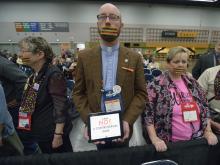
The United Methodist Church is struggling to maintain unity amid deep divisions over Scripture and sexuality, the presiding bishop of America’s second-largest Protestant denomination acknowledged.

The morning prayer that starts each session of a major gathering of Catholic churchmen underway here is an important chance for the 270 cardinals and bishops from around the world to set a meditative tone for what are contentious debates about church teachings on sexuality and family life.
With Pope Francis leading the way, the prelates seated in a large Vatican lecture hall chant the traditional Latin prayers pausing near the end for a brief reflection on the day’s Scripture by one of the bishops at the meeting, known as a synod.
Yet even that moment of spiritual peace is not always a sanctuary from the tensions roiling the three-week meeting that ends Oct. 25.

In another example of Christian discord over gay inclusion, Presbyterian churches in Brazil and Peru have ended their partnerships with the Presbyterian Church (USA) after the U.S. denomination changed its constitution in March to allow clergy to celebrate same-sex marriages.
The loss of the South American partnerships comes on top of the 50 U.S. congregations that formally split from the 1.8 million-member denomination since the church policy changed, PCUSA officials say.
Mexico stopped partnering with the denomination after it allowed the ordination of sexually active gays and lesbians in 2011.
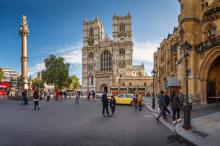
“Most Revd Justin Welby is expected to propose the creation of a two-tier Anglican Church, with Lambeth Palace comparing the proposal to that of a married couple ‘moving into separate bedrooms,’ instead of full scale divorce over the issue.
A Lambeth aide is also quoted as saying the Archbishop doesn't want his successor ‘spending vast amounts of time trying to keep people in the boat and never actually rowing it anywhere.’
The Archbishop believes successful discussions may allow him to maintain relations both with the liberal churches of North America, which recognise and encourage gay marriage, and the African churches, led by Kenya, Uganda, and Nigeria, who are agitating for the recriminalisation of all homosexual activity in their countries.”


The president of the Boy Scouts of America on May 21 called for an end to the group’s ban on gay troop leaders.
Robert Gates, a former Secretary of Defense, said in remarks prepared for a meeting of the organization’s leadership that “we cannot ignore the social, political, and judicial changes taking place in our country.”
Gates said he was not proposing a formal rule for the group — yet.

Only a few dozen worshippers attend Boston’s Tremont Temple Baptist Church on a typical Sunday, but the historic church was once so prominent that legendary preacher Dwight L. Moody called it “America’s pulpit.”
This week, Tremont’s massive auditorium played host to influence once again when 1,300 Christian leaders gathered for the Q conference to discuss the most pressing issues facing their faith. There was no official theme, but one strand wove its way through multiple presentations and conversations: America’s — and many Christians’ — debate over sexuality.
While at least three other Christian conferences during the past year focused on same-sex debates, this is the only one to bring together both pro-gay speakers and those who oppose gay marriage and same-sex relationships.
“The aim of Q is to create space for learning and conversation, and we think the best way to do that is exposure,” said Q founder Gabe Lyons.
“These are conversations that most of America is having, and they are not going away.”
Which is not to say Lyons’ decision was without controversy.
Eric Teetsel, executive director of the Manhattan Declaration project that aims to rally resistance to same-sex marriage, urged Lyons to rescind his invitations to pro-gay panelists, whom he called false prophets professing to be Christians. Owen Strachan, president of the Council on Biblical Manhood and Womanhood, echoed the sentiment and tweeted that he was “shocked that @QIdeas features pro-‘gay-Christianity’ speakers.”
Lyons did not respond publicly to the criticism, but said such positions were rooted in fear.
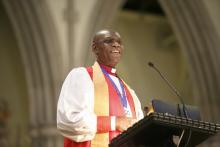
African Anglicans welcomed the appointment of a Nigerian bishop as the next secretary general of the 85 million-member Anglican Communion, even as others criticized the appointment because of his anti-gay comments.
Bishop Josiah Atkins Idowu-Fearon beat other applicants from Oceania, Asia, Europe, and the Americas and will assume the mostly ambassador-type post at a time when the worldwide communion remains estranged over homosexuality and same-sex marriages, especially in Africa.
“He is articulate and very well educated,” said Bishop Julius Kalu of Mombasa, Kenya, diocese.
“His position on traditional Anglicanism is very firm. This is good for us.”
Kalu said the appointment had come at the right time, when African Anglicans needed a bigger voice within the communion.
“The church is growing fastest here,” said Kalu.

Little by little, the direct sun of spring is vanquishing the snow of this long winter, and new life is starting to emerge.
Something similar is happening in my home state of Indiana, where the darkness met behind closed doors to conspire against certain citizens in the name of religion.
For a time, hatred prevailed. But then a more-direct sun began to shine in the American heartland, and people took notice of what the Republican-controlled Legislature and cowardly governor had done.
The people spoke out. It started with leaders in the tech community (Salesforce, Apple, Angie’s List) and, to my amazement, pillars of the sports establishment, such as the NCAA and NASCAR. Soon, citizens across Indiana and the nation condemned the state’s so-called Religious Freedom Restoration Act as little more than legalized discrimination.

In the realm of biblical arguments in support of same-sex relationships, I’ve always found one — “Jesus never said anything about homosexuality” — to be particularly weak.
After all, Jesus also never said anything about rape, molestation, bestiality, torture, cyber-bullying, insurance fraud or elaborate pagan rituals involving self-mutilation and child sacrifice. That does not, by default, earn any of those things the Lord’s unconditional seal of approval.
What’s more, I’m not sure if the argument’s underlying premise is even true. Because, in the Gospels, Christ may indeed have failed to specifically broach the topic currently preoccupying the American Evangelical church, but he did address the subject, in a manner of speaking, in Matthew 22 and Mark 12.
In those two brief, but pivotal, passages of scripture, Jesus captures the essence of the Christian ethic, mission, calling and faith in an incredibly simple and beautiful way. And he did so, interestingly, not as a standalone teaching, but in answer to a question from his critics.
It starts when a group of Pharisees, taking the tag from the Sadducees — who had been silenced in the previous back-and-forth — descend on Jesus, with the goal of ripping open a can of good, old-fashioned pwnage, first-century style.

Gay marriage was never on the agenda at the recent Bishops’ Synod on the Family and the subject “did not cross our minds,” Pope Francis said in a new headline-grabbing interview.
Keeping to a format that has become a favorite for this pope, Francis used a high-profile interview to shed light on his thinking, and Vatican policies, on a number of hot-button social issues.
In an interview published Dec. 7, Francis told the Argentine daily, La Nacion, that the Catholic Church must help parents support their gay children. At the same time, he maintained that allowing, condoning or even adapting to same-sex marriage was still not on the church’s agenda.
This was one of several controversial issues he broached in the interview with papal biographer Elisabetta Pique:
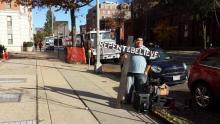
Some leaders use trending topics or hashtags to build momentum around a certain conversation. The idea is that by pointing followers to a catchy hashtag, activists can spark conversation and rally supporters around a cause. On Nov. 24, for example, Twitter lit up with the hashtag #PrayForFerguson after a grand jury decided not to indict a white police officer who fatally shot a black teenager.
One of the earlier noteworthy mobilizing campaigns included #KONY2012, a movement founded by a Christian, who launched a campaign to try to capture African Lord’s Resistance Army leader Joseph Kony. First Lady Michelle Obama famously participated in the #BringBackOurGirls campaign after more than 200 Nigerian schoolgirls were kidnapped by the terrorist group Boko Haram.
But everyone on Twitter is learning that a hashtag cuts both ways — it can be hijacked or lampooned by detractors, and it’s a key way that online activists are pushing back against opposing messages or what some might even call hate speech.

Philadelphia Archbishop Charles Chaput says hot-button socio-sexual issues won’t be the central focus when the World Meeting of Families welcomes Pope Francis to the City of Brotherly Love next year.
Chaput told a Vatican conference on marriage and the family Nov. 19 that next year’s event comes “at a critical moment in global culture” and willaddress a broader scope of concerns.
“It will deal with a wide range of family issues where our religious faith is both needed and tested,” Chaput said.
“These are matters that affect all families, not only in the United States but on a world scale. So we want to focus next year not just on the neuralgic sexual issues that seem to dominate the American media.”
Reflecting the change in emphasis under Pope Francis that was evident at the recent Vatican Synod on the Family, the four-day event in Philadelphia will look at poverty and the family, marital intimacy, raising children, and the impact of divorce, as well as issues affecting the elderly and the disabled.
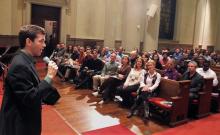
It used to be that defining an “evangelical” was pretty straightforward: some version of a “born-again” experience, a deep appreciation for the Bible as the written Word of God and a conviction to spread salvation to the masses.
Opposing homosexuality wasn’t part of that holy trinity, but for most evangelicals, it was more or less a given that all sexuality outside of man-woman marriage is sinful. Not so much anymore.
Growing cultural acceptance of homosexuality is leading many Christians to reconsider their historic opposition. As intractable as the debate itself can be, American evangelicals nonetheless are experiencing lively conflicts over maintaining boundaries. What can you believe about gays and still call yourself an evangelical? And who gets to decide?
In October, the Vatican’s Synod on the Family and a major conference of establishment evangelicals in Nashville both featured softer rhetoric on gays and lesbians while reaffirming the view that homosexuality is morally disordered.
Last week in Washington, however, a gay evangelical activist laid out a biblical argument for an affirming view.
Matthew Vines was raised in a conservative Presbyterian congregation in Wichita, Kan. Realizing and accepting that he was gay, Vines neither abandoned religion nor sought out a more affirming church. Instead, he delved deeply into the Bible and Christian teaching. He came away with the conviction that biblical Christianity could affirm same-sex relationships.
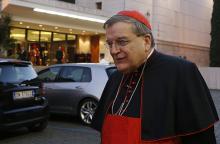
American Cardinal Raymond Burke, the feisty former archbishop of St. Louis who has emerged as the face of the opposition to Pope Francis’ reformist agenda, likened the Roman Catholic Church to “a ship without a rudder” in a fresh attack on the pope’s leadership.
In an interview with the Spanish Catholic weekly Vida Nueva, published Oct. 30, Burke insisted he was not speaking out against the pope personally but raising concern about his leadership.
“Many have expressed their concerns to me. At this very critical moment, there is a strong sense that the church is like a ship without a rudder,” Burke said.
“Now, it is more important than ever to examine our faith, have a healthy spiritual leader and give powerful witness to the faith.”
Burke is the current head of the Vatican’s highest court known as the Apostolic Signatura, but he said recently he is about to be demoted. There is speculation he will be made patron of the Order of Malta, a largely ceremonial post.
“I have all the respect for the Petrine ministry and I do not want to seem like I am speaking out against the pope,” he said in the interview. “I would like to be a master of the faith, with all my weaknesses, telling a truth that many currently perceive.”
“They are feeling a bit seasick because they feel the church’s ship has lost its way,” he added.

When Southern Baptists convened a national conference in Nashville, Tenn., this week to discuss issues of human sexuality, bringing conservative evangelicals and LGBT Christian activists into the same ballroom was a recipe ripe for potential fireworks.
Perhaps the most shocking thing was how few fireworks there were.
The Southern Baptist Convention’s Ethics and Religious Liberty Commission was clear: Sex is reserved between a man and a woman within the bonds in marriage. And openly gay evangelicals in attendance were equally clear: Homosexuality is not incompatible with Christianity.
No concessions were made, but leaders on both sides expressed surprise at how the two agreed to coexist. Put another way: The old emphasis on “Love the sinner, hate the sin” has become more a version of simply “Love all sinners. Ask questions later.”
“I do want to apologize to the gay and lesbian community on behalf of my community and me for not standing up against abuse and discrimination directed towards you. That was wrong and we need your forgiveness,” said North Carolina megachurch pastor J.D. Greear, drawing applause.
“We have to love our gay neighbor more than our position on sexual morality.”
![Houston Mayor Annise Parker. Photo courtesy of Zblume (Own work) [Public domain], via Wikimedia Commons/RNS.](https://sojo.net/files/styles/medium/public/blog/Annise_Parker-336x369.jpg)
Houston Mayor Annise Parker, who drew headlines for becoming the first openly lesbian mayor of a major American city, led support for the ordinance. The measure bans anti-gay discrimination among businesses that serve the public, private employers, in housing and in city employment and city contracting.
Under one of the hotly contested parts of the ordinance, transgender people barred access to a restroom would be able to file a discrimination complaint.
The ordinance, which exempted religious institutions, was passed in June, though its implementation has been delayed due to legal complaints.

The world’s Catholic bishops on Oct. 13 signaled a move toward greater tolerance of gays and lesbians, an about-face so unexpected that leaders of the church’s right wing called it a “betrayal.”
Noting that gays and lesbians have “gifts and qualities” to offer the church, the mid-point assessment reflected the impact that Pope Francis seems to be having on the two-week Synod on the Family as he pushes for a more open, less doctrinaire approach.
“Are we capable of welcoming these people, guaranteeing them a fraternal space in our communities?” said the communique from the nearly 200 bishops and lay delegates. “Often they wish to encounter a church that offers them a welcoming home.
“Are our communities capable of providing that, accepting and valuing their sexual orientation, without compromising Catholic doctrine on the family and matrimony?”
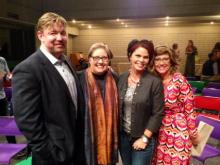
It was a gathering that would have been unthinkable just five years ago.
On a cool summer evening, in a borrowed classroom overlooking San Francisco Bay, about 150 men and women gathered to screen a short documentary about a Mormon family whose 13-year-old son came out as gay.
The Montgomerys, who accepted their son and his news, were ostracized by church members, some of whom refused to accept Communion distributed by the young man in church. Like many conservative Christian denominations, the 15 million-member Church of Jesus Christ of Latter-day Saints bans homosexual activity and considers it grounds for exclusion from Mormon rites, rituals and even the afterlife.

A well-established international Christian student group is being denied recognition at almost two dozen California college campuses because it requires leaders to adhere to Christian beliefs, effectively closing its leadership ranks to non-Christians and gays.
California State University, which has 23 campuses, is “de-recognizing” local chapters of InterVarsity Christian Fellowship, an evangelical Christian group with 860 chapters in the United States. The university system says InterVarsity’s leadership policy conflicts with its state-mandated nondiscrimination policy requiring membership and leadership in all official student groups be open to all.
“For an organization to be recognized, they must sign a general nondiscrimination policy,” said Mike Uhlencamp, director of public affairs for the California State University system. “We have engaged with (InterVarsity) for the better part of a year and informed them they would have to sign a general nondiscrimination statement. They have not.”